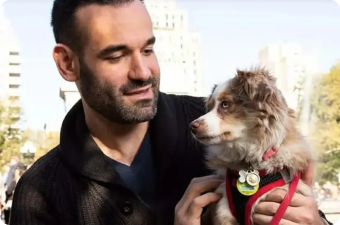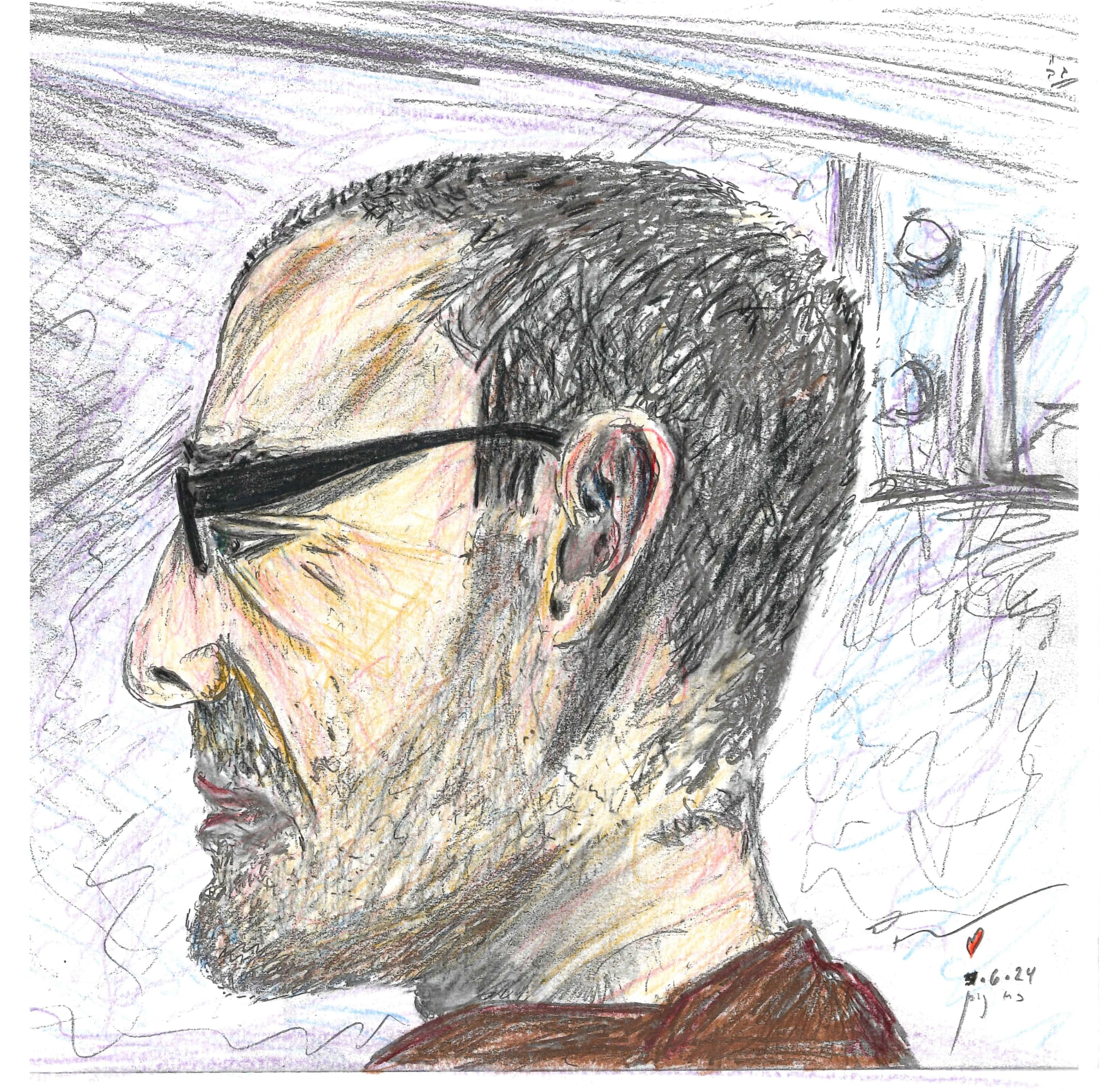I have been thinking a lot about hunger lately, because I’m often hungry here.
The kosher meals, cheap TV dinners full of soy, sodium, and fillers, are calorie-short, even if you could eat all of them. They are frequently moldy or full of melted or broken bits of plastic. I kept a log for a few weeks and ranged from 800 to 1200 calories a day, most-often under 900.
Hey, at least I’m going to walk out of here with abs!
If I’m still able to walk — I’ve collapsed twice on the compound and had to be carried to medical. The medical unit gives me a Pedialyte, yells at me to pee in a cup for a drug test, and tells me to rest. Besides the diet, infections and illness are near constant. There’s a lot of new guys rotating through a prison, and hundreds of us packed into a confined space — you’re going to be sick, a lot, here, and if you’re in any way immunocompromised, it’s a rough and risky go. My Case Manager recommended I be moved to home confinement, and probation confirmed my housing, so let’s hope and pray the BOP moves quickly to make that happen, please G-d.
I work to stay positive on here, but positivity in a utopia is no challenge — Well, actually…
Hunger is one of the most painful experiences, because it’s a double pain, the physical pangs, and the mental feeling that the world is being cruel and “not taking care of you” or that you’ve “failed” to take care of yourself.
But Hunger is also empowering.
Hunger is what drove our ancestors to travel, to expand their world, in search of food. It the reason the Jewish people encounter Egypt — famines in our land, first under Abraham, then Yaakov’s sons. Joseph says our years of slavery are to prepare us for a “great deliverance”.
Sometimes, hunger is prescribed. We fast. In doing so, we become sharper. There are mental, physical, and spiritual benefits to depriving ourselves of food.
A lack of hunger is far worse than a little bit of it.
My dear friends in the UAE tell me about their friends and relatives, young men who fall into addiction and depression because they don’t need to work due to immense family wealth. We have this problem in the USA, nicknamed “affluenza”, and of course it’s common worldwide.
There is a story where Maimonides, The Rambam, was called in to treat the son of the Sultan of Cairo, a prince who was severely depressed. The Sultan had tried all of his doctors, magicians, sorcerers, wizards… and finally gave up and called in the Jew! The Rambam walked up to the prince, pulled his arm back, and slapped the prince across the face! The royal guards rushed in to arrest the Rambam, but he held up his hand and asked the prince, “Are you depressed now?” “No! I’m angry!” “Aha!” The Rambam explained that the prince was depressed because everything was taken care of for him, he had no challenges — no hunger. His brain was hungry for a challenge. We need hunger.
(A few months later, the Sultan called the Rambam in because his brother wasn’t moving. The Rambam pulled his arm back, slapped the brother across the face… and the royal rolled off the table and onto the floor. “Yep, he’s dead!” said the Rambam.” (Ok, this is a lie, but look for my children’s book “RamBAAAAM! Stories of the Rambam slapping people.”))
We are formed “in the image of” the Creator, so we need to create.
We need to, at the very least, be part of creating something bigger than ourselves.
Did G-d need to create us? No. He needs nothing. Yet, He did. Given the choice of doing nothing and creating, G-d chose to create.
In fact, not only did G-d spend six days creating, and only one resting, but Jewish tradition tells us G-d creates the world anew every moment, that we exist under His constant creative willpower.
G-d wants us to create, too. He is explicit about this, and wastes no time letting us know.
In fact, G-d’s first commandment in the Torah, to Adam and Chava, is “Be fruitful and multiply, and fill the land”.
(Some translate “dominate” the land.)
The story of the Tower of Babel is often misunderstood. Rabbi Ari Lamm explains well that the plain text, read in Hebrew, describes a people who conspire to build a tower and city where everyone can be together and the same. They are worried they will become diverse and spread out — the opposite of G-d’s first commandment to humanity. G-d wants diversity of thought, he wants creativity.
We are wired to create. There is intrinsic joy in introducing friends, business associates, and most-of-all couples.
We throw the biggest parties for these unions, often celebrating for days or weeks, and we celebrate their creations, and repeat the celebration every year on the anniversary of their birthday. Like G-d, we rejoice (speaking in human terms) in the creation of new possibilities and new life, which is the creation of infinitely more possibilities.
In fact there is a Jewish tradition that G-d spends his time after creation making matches and that this is his “most difficult” task. My mom, like every Jewish mom, will probably tell me to stop making it so difficult for Him!
This is why our prison and “justice” system is so wrong, and so heartbreaking. Rather encouraging men and women to create, to build lives, to build families, they are locked in cages where their only outlet for much of the day is to sit in front of the TV, consuming instead of creating.
There may be some required courses for some folks, like a GED and English-as-a-second-language (Still called that even if they already speak two languages! “English, we’re always number 2!”), but there’s no art program, no Tony-Robbins-esque behavior skills programs, no lessons on how to get and stay in the right mindset to dream, and to manifest those dreams…
So men turn to TV. Some play chess, for hours. Some play dominoes or cards. Many sit around and bullsh*t with each other. But most burn years in front of screens.
Some men, the rare ones, find their soul and its need to create and learn (learning is a creative act — creating new pathways, and new possibilities. You imagine and create with your knowledge).
Ollie creates remarkable, lifelike boats, fishing plaques, and remarkable Xmas decorations (his cell looks like a Hobby Lobby or Michael’s in December).
Zater creates yoga classes, mindfulness and Tony Robbins programs, writes books and essays, and thousands upon thousands of pages of compassionate release drafts.
“Mr. C.” runs a restaurant out of his cell. “Chris the Jew” and Jay experiment each week making no-bake cakes.
“Muslim Mike”, one of Zater’s best friends, a great guy, and always a fun chat, dreams up the Halal food truck he’ll run when he’s out (I helped him with a few sketches so he can play with color themes). There’s a few prison chefs — it’s incredible what you can do with a plastic bowl and some hot water or ice.
Eric hacks found parts to make cells more humane.
Nick makes yogurt.
Tommy does remarkable leatherwork, making handbags, briefcases, covers, and belts that rival anything on the Pacheo from Ponce does mind-blowing art.
There are a surprising number of skilled tattoo artists “inside”.
Some men paint, make pottery, write poetry, lyrics…
Some build businesses with incredible ingenuity and perseverance…
But the vast majority — far too many — sit in their green, plastic, Australian chairs and watch TV…and watch TV…
and watch TV…
Years and years of TV.
But they would learn if someone inspired them. They would create.
Last week I offered a drawing class, and with just 1.5 days notice, the room filled with guys eager to learn, who, at the end, asked when the next class would be. The staff were shocked at the response.
And more guys want to take it.
Some were timid and talked themselves out of the class.
They day after the class I was sitting in the library and overheard guys about five feet down the row of tables asking each other if they’d taken the drawing class. “No, I can’t draw,” said one guy. “That’s why there’s a class,” I interjected. “Did you draw that?” he asked, looking at a sketch of a car I was doing. “I’m the one who taught the class.” “I can’t draw for my life.” “Try this,” I said, pulling out the worksheet I’d made for the class, and walked him through the steps to draw a cube. “See, you can do it.” “But I can’t draw.” “You just did! Look. That’s it. That voice telling you can’t do something is a lie,” I plagiarized Zater, “You can learn pretty-much anything. It’s just a series of steps and daily practice.” Another of his friends, who’d taken the class, walked over and encouraged him, “You did it better the first time than I did!” He agreed to keep the worksheet and practice sheet and sketch daily — from “I can’t” to “I will” in under 15 minutes.
Encouragement mixed with simple steps goes a long way.
I encouraged a friend who was timid about meeting his 4-year-old son for the first time to write a children’s book that was a a metaphor for his journey and recovery in prison, and within a day he had the plot outlined and much of it written. He went from morose to excited and eager. Really excited. It was as if a light went on inside him… I offered to sketch out the illustrations and help get it published. His entire demeanor changed for the better, and —
most importantly — now he’s eager to meet his son. He no longer sees himself as an embarrassment laying in bed burning time, now he’s an author!
Where are the rest of the art classes? The writing courses? Where is the Tony Robbins for Prison? How do we take the Zater approach and make it not only systematic but system-wide? How do we make it the POINT and PRACTICE for the system?
If we sit men in front of the TV or the dominoes table for hours a day, how can we expect anything other than a return to their old life? This is cheating them and our society out of improvement. We are sending men back into the streets unprepared — and not for lack of time.
We can’t blame budget for it, either. Today, men could learn from videos and apps on their tablets — were the system to allow such learning. It costs nothing to play a YouTube video, and many apps like DuoLingo are free or cheap. It would cost nothing to allow men to use such apps and learn from videos.
So why hours of TV and not hours of educational videos?
It is a common refrain that the system is not designed to “correct” men’s paths, but to “warehouse” humans.
However, cops and prison guards are rule followers, rarely out-of-the-box thinkers. (They sign up to work for 20 tasks that uplift, encourage, and build men into creators and providers rather than TV-consumers?
Hunger is good. “Were it not for the evil inclination,” Rabbah Nahman said, “men would not build homes, take wives, have children, or engage in business.” (Genesis Rabbah 9:7 (Jewish Wisdom 213))
We want the men in prison to do these things. Yet we do not invest in their abilities to get there.
Many men do not even have a pencil, and getting a sketch pad or some pencils or markers is an expensive and frustrating ordeal. It is impossible to get YouTube or other videos on how to draw or sculpt. Some get books, many cannot afford them or do not have friends to send them.
Men cannot sign up to take online courses from Harvard and many other universities under EdX, or via many other programs, but they can pay $4 to see a movie (which they have to pay each time they watch it!). This is nuts when a certificate from Harvard, “the Brandeis of the Ivys”, is just $50, and likely they’d be willing to discount it for men and women in prison. TED Talks, Tony Robbins videos, and the videos from many conferences (including my conferences at 12gurusHealth.com and 12gurusCharity.com ) and education programs are 100% free online — but inaccessible to men in prison. Why? Isn’t the goal to educate and reform these men so they’re better able to provide for themselves and others?
Worse, once outside, even the brightest and most-capable men struggle to gain employment, their conviction a “Scarlet Letter” against them, regardless of how much they refined themselves. This is proof of our society’s failure. Either we believe the “system” helps men heal, or we must fix the system until we are convinced it does.
We must do better to help men dream and manifest their dreams. This is the #1 level of Charity in Judaism, to help men stand on their own, to help them become providers.
(See part 2)
(Part 2)
For what it’s worth, some of the best workers we’ve hired have been to prison, many having beaten addiction and other struggles, many coming from brutal challenges. These are impressive people who have overcome adversity and for whom big challenges seem light in comparison.
I encourage you to hire men who have come from prison, and to encourage your friends and companies to do the same.
I am not alone in saying that these men make exceptional teammates. My wonderful friend Jeffrey Korzenik has an excellent book on second-change employment, and tirelessly advocates for it while still pulling long hours as a top banking executive. You can find his book, writings, and videos online.
Why do these men make such great teammates? There are many reasons, but a big one is… they’re hungry.
If you’re looking to hire — we know some great guys who’ve gotten out and are looking for work.
With love, Ari
============================
Group email. Draft 1.0.
I’ve probably mucked up a bunch of quotes and name spellings. As always, check sources.
You may share this message.


